Spring Fever on the Canal du Midi
Pledging to get back to nature, Rhiannon Rees embarks on a leisurely cruise along France’s most famous waterway – and becomes hopelessly smitten with life in the barge lane…
If two years living and working in London taught me anything (other than to “mind the gap”), it’s that I’m no urban baby. I need greenery in my scenery. Thanks to bleary-eyed mornings snorting soot and battling commuters for air on the tube (I’m short – I always lost), I started to feel rather like a wilting flower.
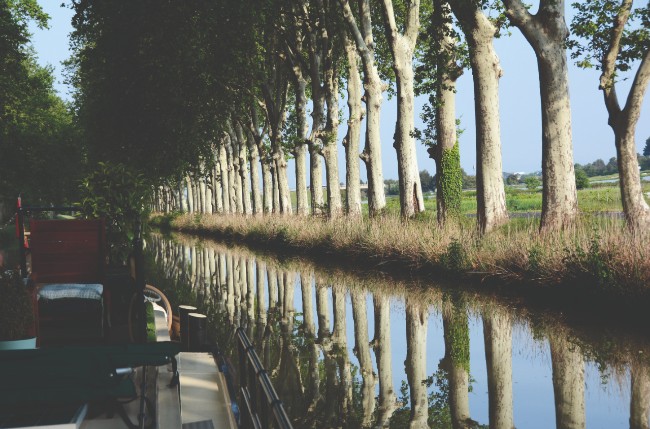
The Canal du Midi is a proud World Heritage Site. Photo credit: Barge Saraphina
It was during this smog-tinted chapter of my life that I vowed to repot myself in new soil. Never again would I tear myself away from my rural roots – wherever I went in the world, I would hunt out the public parks; the open fields; the meandering waterways. And so it was that I found myself aboard a very special luxury barge in mid-April, drifting without a care along the legendary Canal du Midi.
It was a beautiful time to be in France. En route to our pick-up in Narbonne, my better half and I sniffed out boulangeries and blossoms in Toulouse, hitting the jackpot in Square Charles de Gaulle behind the Place du Capitole. It wasn’t quite the explosion of sakura you’d see in my husband’s native Japan, but it was a pretty picture nonetheless. We sat on a bench beneath cedars and sycamore maples, wolfing down fresh chocolatines (Occitanie’s answer to pain au chocolat) and watching water jets spear the air.
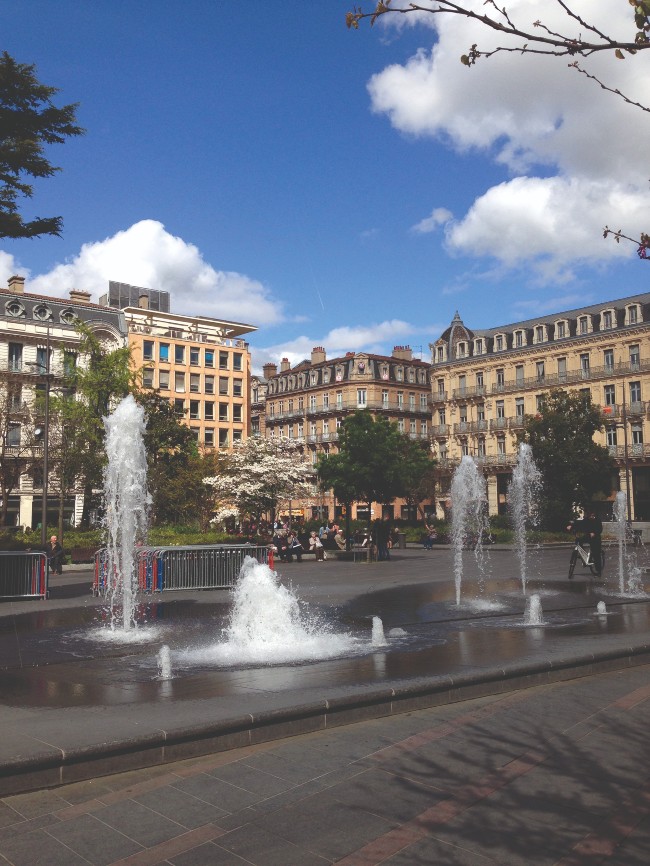
The blossoms and water jets of Toulouse. Photo: Rhiannon Rees
Everywhere we looked, we found tell-tale signs of spring. Even during our onward train journey through Carcassonne and eastward, we glimpsed hot-pink cherry blossoms whip past the tracks and bright yellow flowers scattered across the banks, even more brilliant on an overcast morning. The old adage popped into my head: “Life isn’t about the destination; it’s about the journey”. Watching la France profonde unfurl outside our carriage window, I was inclined to agree.
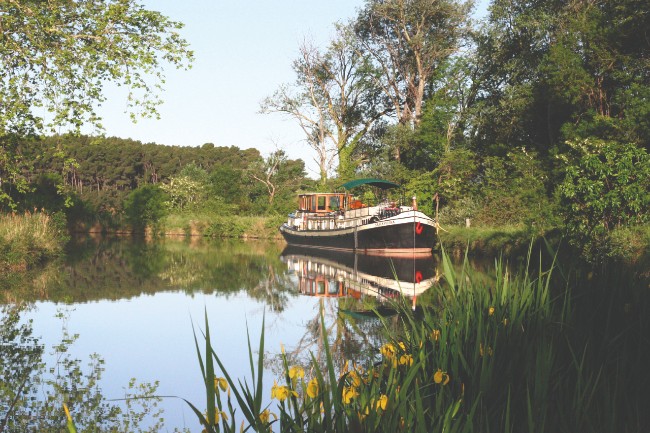
Spring brings the Canal du Midi to life. Photo: Barge Saraphina/ Damian McArthur
TESTING THE WATERS
Our this-is-what-life’s-about journey took us through miles of vineyards, which we’d later learn are dominated by Carignan, Cinsault and Grenache grapes, and over a bridge to an unassuming hamlet called Cruzy. Lo and behold, there she was – the UNESCO-listed Canal du Midi – and, nestled in her bend, the most splendid boat I’d ever clapped eyes upon. My husband and I exchanged glances and approached with the sort of caution you’d normally reserve for a wild animal. Neither of us had been canal-cruising before, and barge Saraphina was a seasoned old girl.
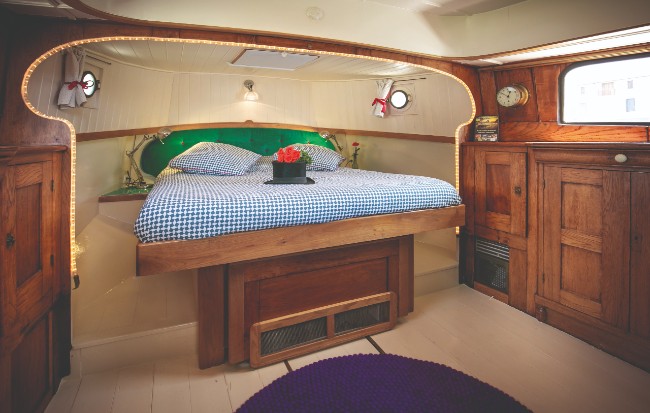
Cabin Iona on the Barge Saraphina features woodwork from the 1920s
Sleek and cream, she looked every bit the lady. Perhaps she wouldn’t bite… if we were well-behaved. Our hosts, captain Finnegan and chef Emily, popped their heads out from the wheelhouse to welcome us – or perhaps size us up – and led us below deck to inspect two surprisingly spacious double cabins and a beautiful kitchen. The wooden fixtures in one of the bedrooms (the cabin we’d later smugly claim as our own) were all original – dating back as far as 1924 – but they were scrupulously maintained, with nary a scratch nor speck of dust in sight. Attention to detail would become a running theme during our stay, and spoke volumes about the couple at the helm.
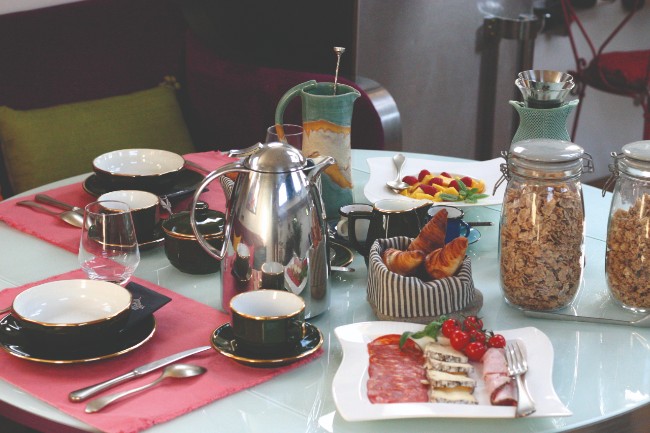
Breakfast on the Barge Saraphina is a relaxed affair
Finn, who hails from Holland, and Emily, from Manchester, England, were ultimately united through their passion for boating and hospitality. They’d worked on France’s rivers and canals independently for years, but all it took was one fateful project to bring the pair together, sparking a relationship not only with each other, but with life on the water. Finn had always yearned to build a boat from scratch, and in what could only be described as a labour of love – to this DIY- phobic writer, at least – he instead transformed the Saraphina into a creature of beauty fit for her “luxury hotel barge” epithet. Considering her less-glamorous past in the early 20th century as a Dutch cargo vessel (for concrete, no less!), this truly was an ugly-duckling tale of the most romantic proportions.
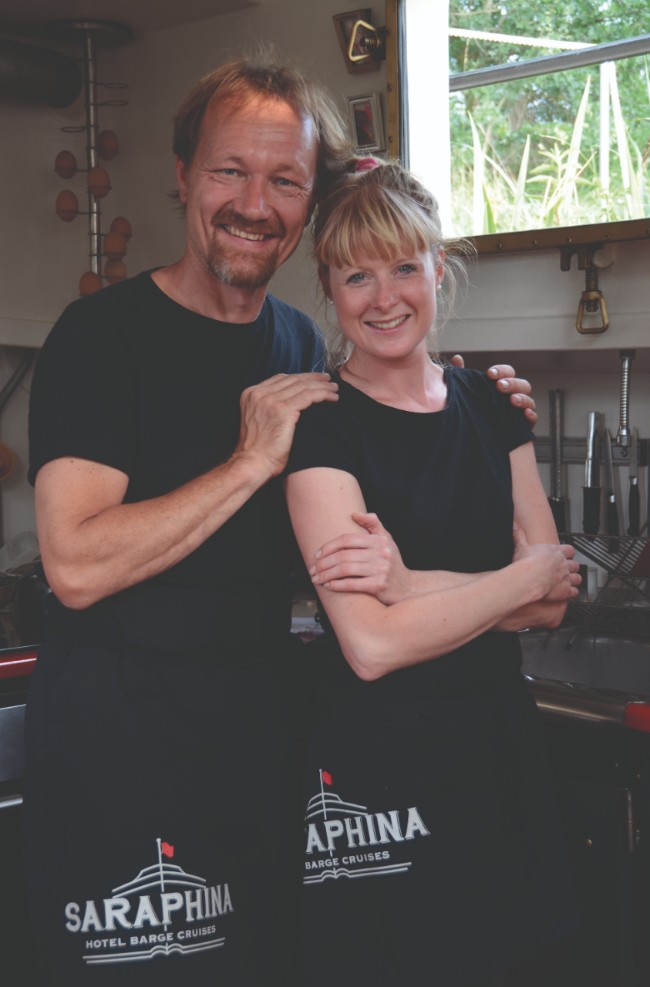
Finnegan and Emily are Team Saraphina
LIFE IN THE SLOW LANE
After we’d unpacked and the light began to drain from the day, we settled around the dinner table for a sublime meal: poached egg resting on a bed of melt-in-your-mouth asparagus and red pepper sauce, and a round of punchy Rocamadour and Reblochon cheese sweetened with walnuts and honey. Just as our legs were starting to buckle, we were greeted with an unexpected birthday surprise for my husband – a lemon cheesecake so sinfully creamy it nearly sent us into a calorie-coma. Savouring every mouthful, we felt the world around us slow into a drunken crawl. When we were eventually ready to retire, after plenty of giggles and local wine, time was as still as the water below us.
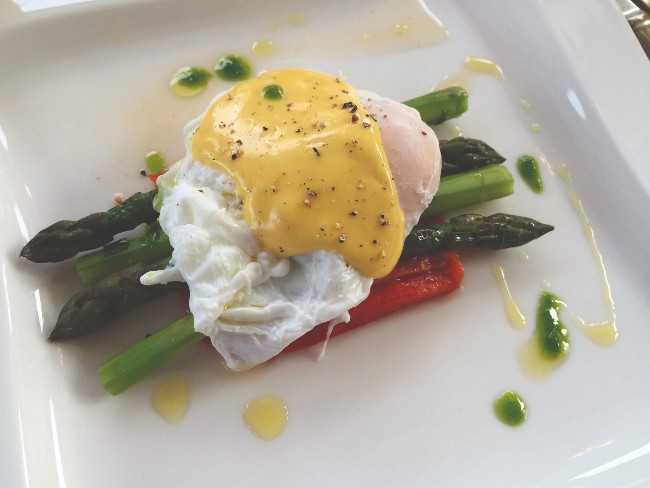
Chef Emily cooks with locally-sourced vegetables and free-range eggs from their own hens. ©Naoki Kashiwagi
We were woken by birdsong the next morning and made our way to the kitchen for a relaxed petit déjeuner and fresh pot of coffee. By this point, our tempo had completely reset. I could practically feel the stresses of daily life melting away with each spoonful of homemade granola! In fact, the following morning was the same… and the next. There was something truly liberating about clambering up on the front deck at 9am instead of switching on my Mac in the office. Dosed with clean country air, it was just as magical to close my eyes and inhale as it was to watch the landscape peel past us, changing every minute from vignobles and rolling pastures to towpaths lined with silver birches and quaint hamlets, like the postcard-worthy Le Somail.
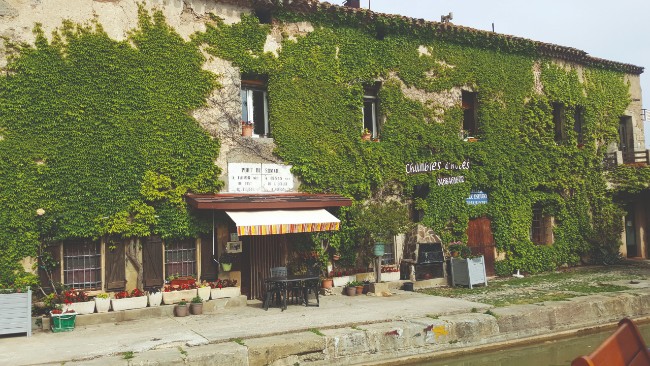
There’s not much going in Le Somail, but its quaint good looks attract snap-happy tourists. Photo: Rhiannon Rees
IT’S THE NATURE OF THINGS
It was during these stretches that we were also able to observe Finn and Emily in action. One of the things that struck me most was how in tune they had to be with Mother Nature in order to negotiate the canal. “This is a windy part of France,” Emily told us one balmy morning, “and the wind comes in batches of three. It might last for just one day, but if it goes on any longer then you know it’s going to last for another two minimum – then six, then nine. Nothing in between. And it normally picks up around midday.” I was alarmed by the specificity but, when my husband and I noticed the first gusts of the Mistral a few hours later, I checked my phone. 12pm on the dot… no kidding.
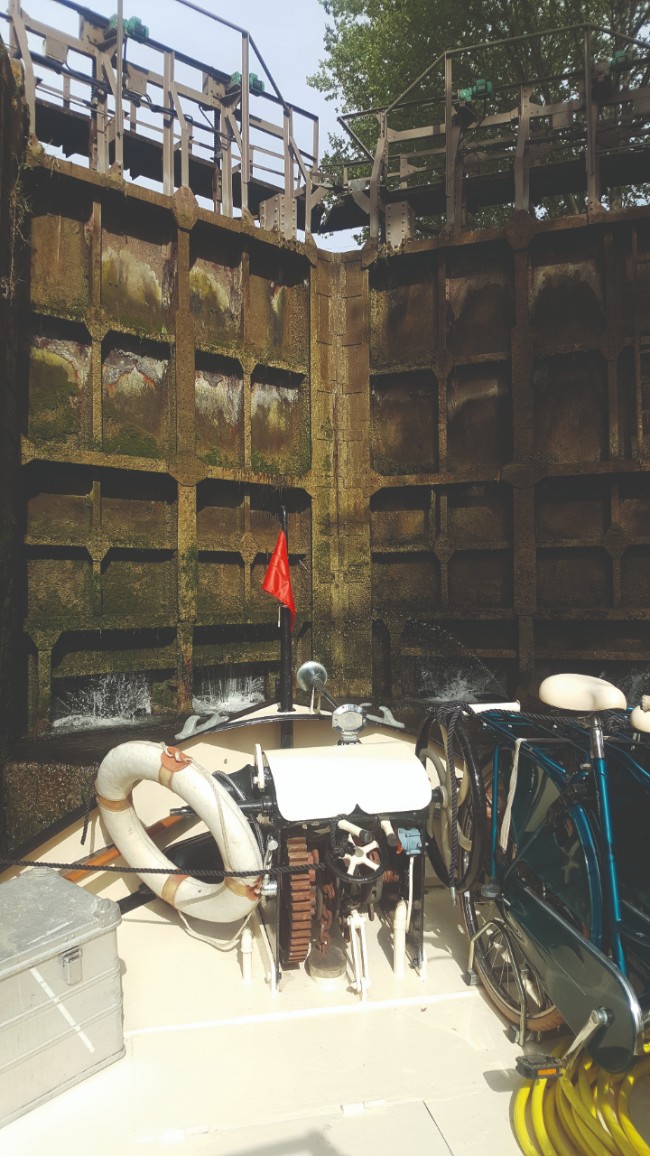
Navigating a lock. Photo: Rhiannon Rees
The pair navigated the Saraphina through several locks and one impressive double-lock, divvying up the work to keep things running smoothly. While Finn mostly remained at the wheel, Emily hopped ashore to moor the old girl and alert the éclusiers (lock-keepers) to our presence and request passage. These sentinels have to stay attentive – in peak season, some 30 to 40 boats can pass through in one day – although it was tempting to imagine them spluttering awake from a nap, cartoon-style. By the way, you never want to approach a lock-keeper at midday. It goes without saying that in France, lunchtime is sacrosanct.
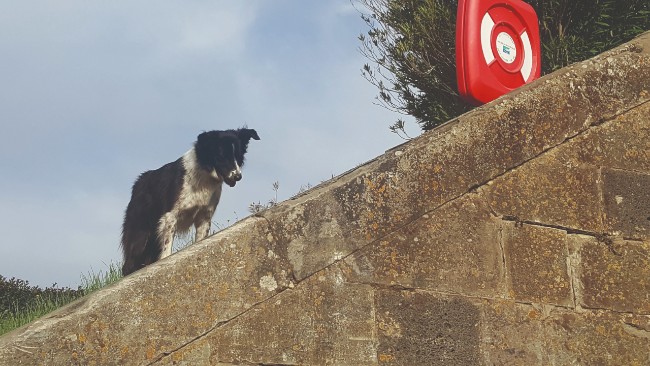
Iris, one of the éclusier’s vigilant companions. Photo: Rhiannon Rees
MOORING AND EXPLORING
When we weren’t lounging on the deck, we were discovering the Languedoc à pied. For our first official outing, we were collected by Team Saraphina’s exuberant Canadian tour guide, Barry, and driven to Narbonne for a spot of market shopping. The mission was twofold: to find un panier; and then a wealth of produce to fill it. After picking out a deep-bellied woven basket for under €10, our small flock proceeded into Les Halles, the town’s enormous covered market. Having first opened its doors 118 years ago, it’s still much as it was back then: a thrill of colours and smells, filled with vendors selling staunchly local fare. We passed all manner of sea creatures – still glistening, alongside meat, fruit and veg, pearly olives and pungent cheeses. Barry also pointed out the family-run restaurant Chez Bebelle, wherein former rugby star Gilles Belzons can usually be seen catching hefty cuts of meat tossed across from the butcher’s stall opposite. It’s quite a spectacle, or so we were told – but this visitor was secretly grateful not to have to dodge flying horse chunks!
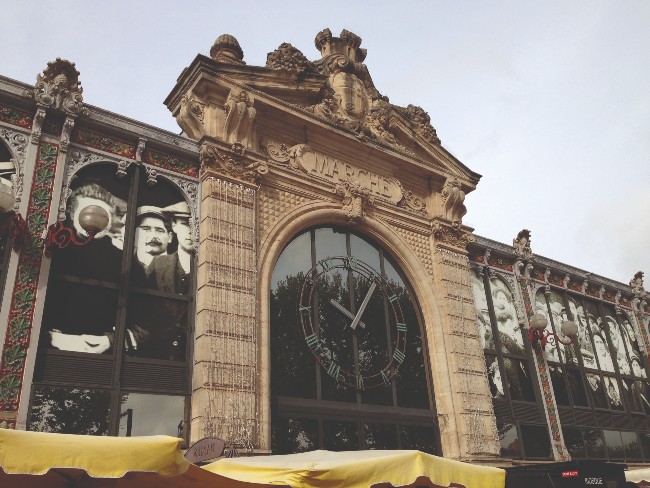
Head to Les Halles de Narbonne for fresh local food. Photo: Naoki Kashiwagi
Our other excursions were similarly unhurried and awash with history, from Narbonne Cathedral to the lovely Abbaye de Fontfroide (more on these must-see gems below) and, finally, L’Oulibo in Bize-Minervois. This olive factory is a poster child for terroir – the link between an area’s natural environment and its produce. In these parts, between the Mediterranean climate and sandstone soil, vines and olive trees grow abundantly. If I can make a sacrilegious confession (and drop my husband royally in it, too), we aren’t the biggest olive fans. That said, sinking our teeth into the mellow green Lucques olive (this region’s star fruit) was something of a eureka moment. With a newfound sense of curiosity, we moved on to sample bowls of Picholines – ever so briny and firm – followed by spoonfuls of syrupy huile d’olive lined up in a row. The whole shop was stacked to the rafters with colourful jars and, in our excitement, we bought a pot of Picholines fraîches as a gift for my mother, completely forgetting that it would never make it through customs in our hand luggage.
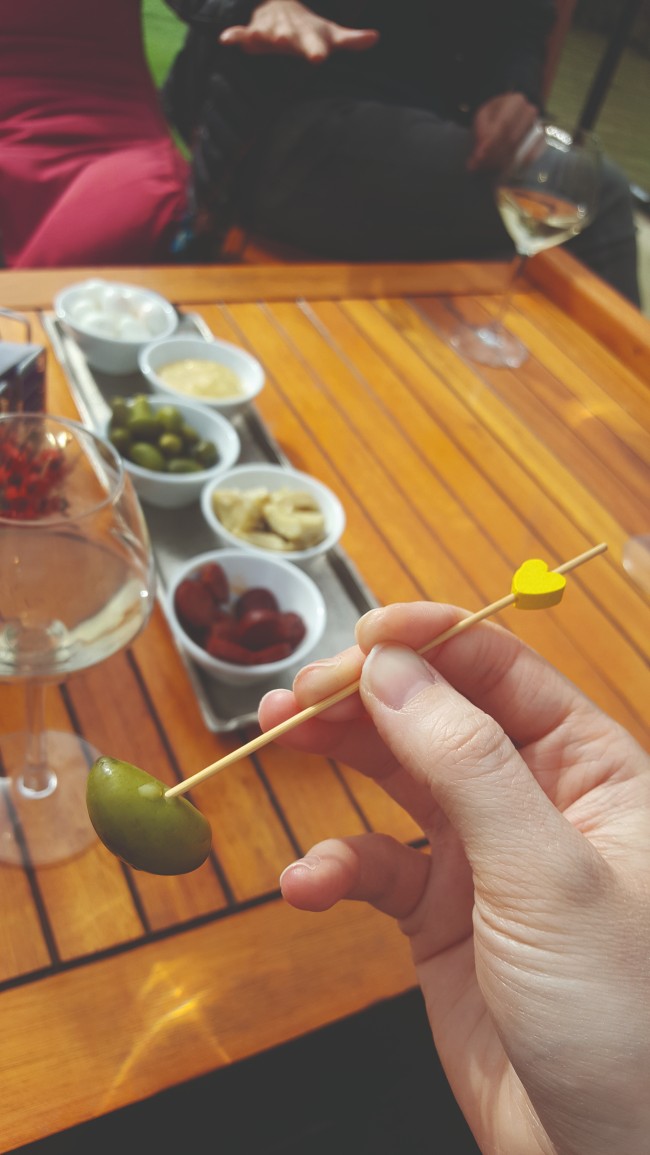
Don’t miss out on Languedoc’s famous olives
But this is where Team Saraphina shines. Experts in hospitality, they go above and beyond to make holidays memorable. A couple of weeks later, when I was once again switching on my Mac at 9am and pining for the countryside, a package appeared on my desk. Inside was a jar of Lucques olives, all plump and glossy, with a personal note from Emily tucked underneath. It seemed that my mother would be getting her olives after all. If I closed my eyes tight and imagined hard enough, I could almost smell the Canal du Midi from the box they’d arrived in; that familiar but elusive scent of old wood and new fruit, of wine and brine and sunny days on the water.
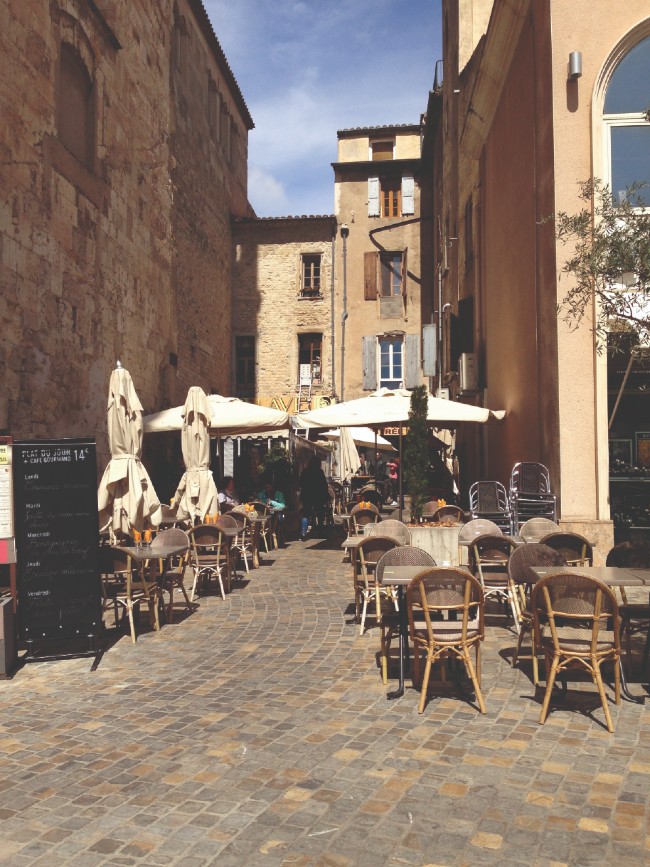
Narbonne. Photo: Naoki Kashiwagi
LANGUEDOC ESSENTIALS
Our trip was organised courtesy of Barge Lady Cruises. This devoted family-owned company has been operating since 1985 and is headed by the formidable trio of Ellen Sack and her daughters Caroline and Stephanie (pictured below), who marry their passion for luxury travel with high- end hospitality to help customers find their perfect barge cruise in Europe.

Stephanie of Barge Lady Cruises
WHERE TO EAT
We enjoyed an excellent lunch here on our second day. While my husband tucked into beef-stuffed pasta shells, my meat-free alternatives included seasoned onions fried in crispy batter, goat’s cheese with aubergine caviar and a plate of desserts, from chocolate crémeux to sorbet, washed down with a post-dinner espresso. The fabulous maître d’ and shaded outdoor terrace are the cherry on top.
Hameau de la Croisade, 34310 Cruzy
Tel:+33 (0)4 67 89 36 36
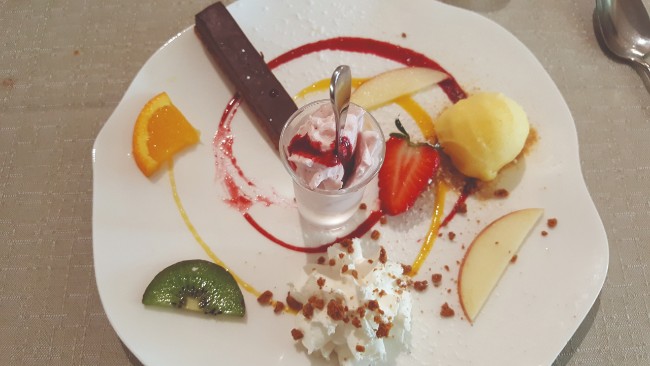
An assembly of desserts at top-notch eatery Auberge de la Croisade
This restaurant in Homps provides brilliant service in a laid-back setting. Meaty meals range from the classic chicken and chips, to lamb shank drizzled with red wine. There’s a wealth of fish dishes, and the herbivores among you can tuck into veggie lasagne, butternut risotto and cauliflower and lentil tagine. The highlight? A palate cleanser of eye-watering citrus vodka granita.
6 Quai des Négociants, 11200 Homps
Tel: +33 (0)4 68 91 23 16
WHERE TO STAY
Finnegan and Emily are expanding their business with a 19th-century guesthouse in the heart of Occitanie. A former sheep farm, this gorgeous dwelling accommodates up to 18 people between three properties, split between the main house and two fully-furnished gîtes. A member of staff will be on site, ready to welcome you and offer advice on daily excursions. Saraphina House will be open from April 2020.
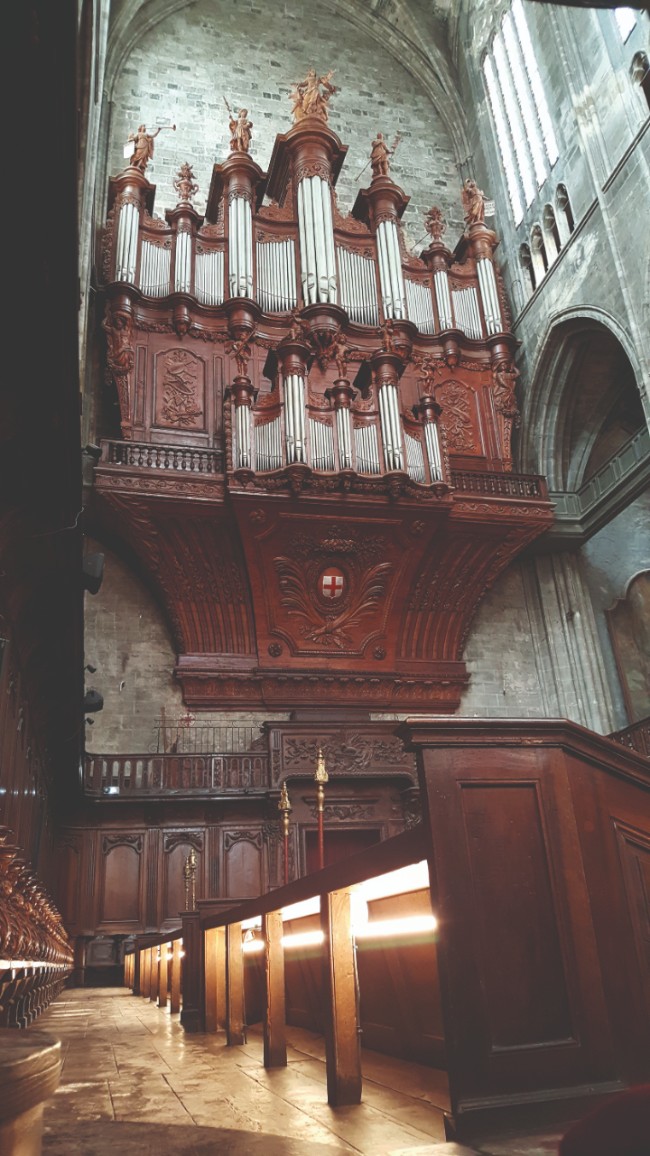
Inside Narbonne’s peaceful cathedral, the enormous organ dates back to the 18th century. Photo: Rhiannon Rees
WHERE TO VISIT
Once the Roman capital of Transalpine Gaul, Narbonne has a long, colourful past and you’ll find historical hangovers everywhere – from the ancient Roman road in the town centre, to the 13th-century Gothic cathedral. Come here for the fascinating carvings, depicting biblical passages played out in eerie scenes of fire and brimstone.
Rue Armand Gauthier, 11100 Narbonne
This 12th-century Cistercian monastery near the Spanish border is a must-see. Based in a valley in the Corbières area, its remote location only makes it more special. Brutal Cathar history aside, this peaceful oasis is a beauty to behold, with its warm stone and perfect cloisters. I recommend dropping by in April; it’s too early for the rose garden, but you’ll be blessed with wisteria instead.
Route Départementale 613, 11100 Narbonne
From France Today magazine
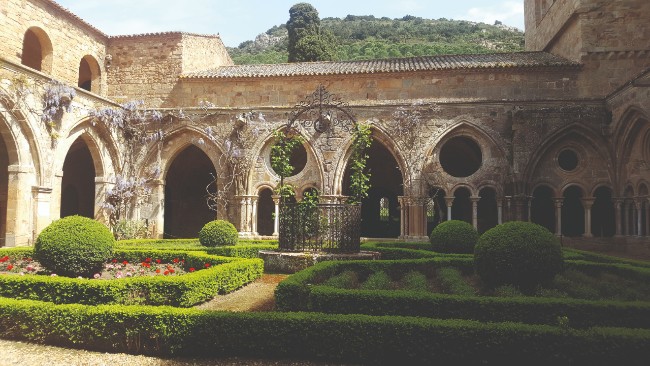
The Abbaye de Fontfroide is a lush holy haven during spring and summer
Share to: Facebook Twitter LinkedIn Email
Leave a reply
Your email address will not be published. Required fields are marked *

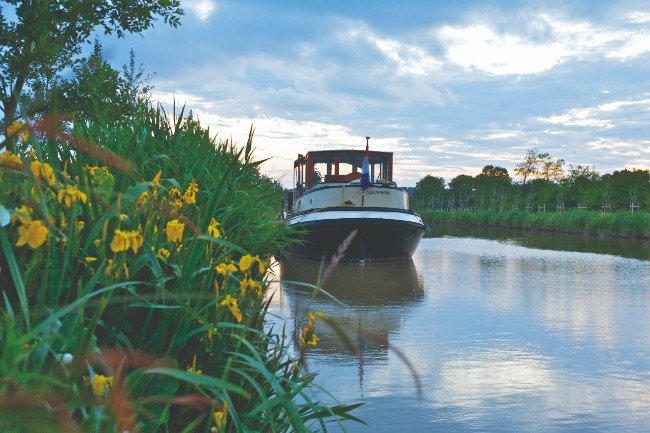

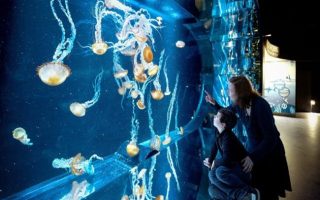
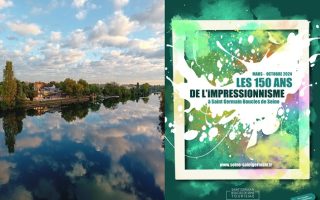
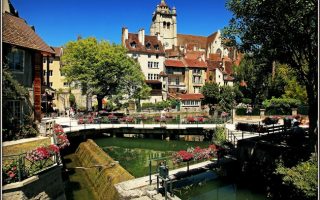
REPLY